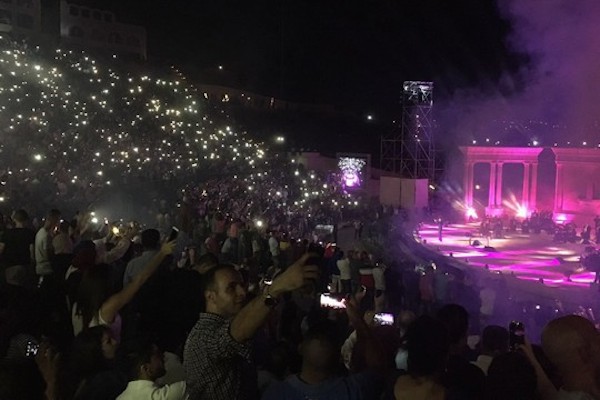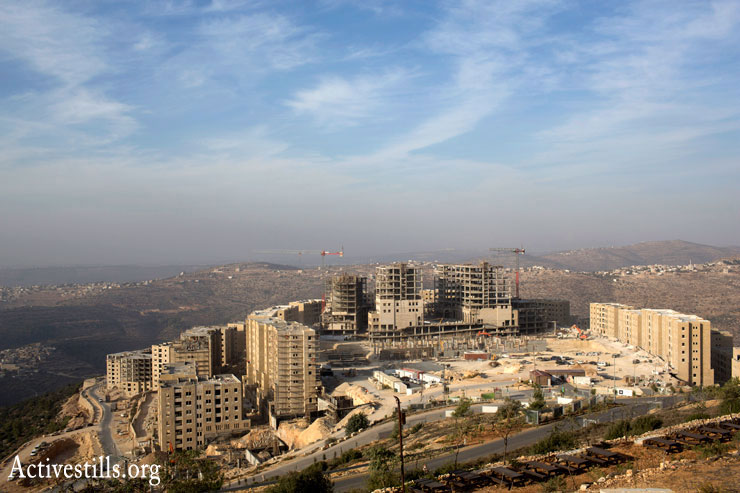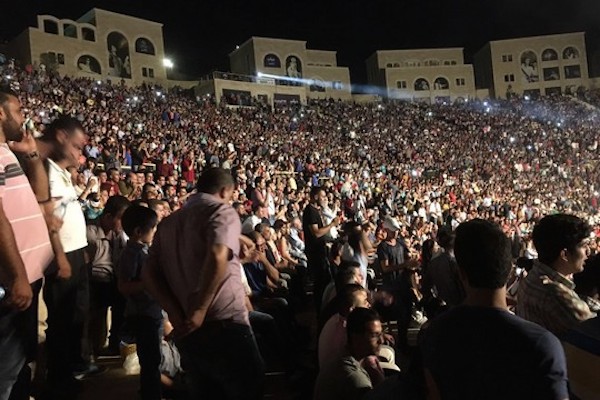For one night, Tunisian megastar Saber Rebaï brought Palestinians in the West Bank just a modicum of normalcy.

Rawabi, Arabic for “hills,” is a sleek name for a Palestinian city that was recently built between Jerusalem and Ramallah. Surrounded by settlements on all sides, the place looks like a standard Israeli bedroom community and has been dubbed “the future of Palestine.”
Yes, this is what they call virtually the sole real estate project promoted by the Palestinian Authority, with the support of moneyed investors like the Palestinian-American businessman Bashar Masri. According to the project’s publications, it is meant to bolster the Palestinian middle class and encourage young families to leave the densely populated cities and villages, buy a modern apartment and live and work in an environment where they can benefit from health services, public transportation, culture and leisure. Some 40,000 Palestinians are expected to move to the city in the near future.
As always, this rather pretentious enterprise has received a fair share of criticism, including over Israel’s involvement in it. Israel actually controls the land on which Rawabi was built, and was the main supplier of the city’s building blocks. As we have come to learn, businessmen are less prone to let a national conflict get in their way, especially when their profits are at stake.

To boycott or not to boycott?
Why am I telling you all this? Because I went to Rawabi on Friday with my partner and son to attend a concert by Tunisian superstar Saber Rebaï, who has occupied the top of the Arab pops for more than two decades. He is a judge on the Arab version of the talent show “The Voice,” and his music has been the soundtrack for lovebirds across the Arab world. And now that he’s in Palestine, is skipping his concert even an option?
Very few Arab artists set foot in the West Bank or do the impossible and perform for a Palestinian audience inside Israel. Every year, there are a couple of exceptionally brave signers, bands or poets who come here, and every year they are welcomed by a heated debate in the press: is going through Israeli immigration tantamount to normalization and putting up with the occupation? Will the singer’s entourage make it through the checkpoints in the first place?
This ubiquitous moral dilemma is not inconsequential when so many artists prefer to avoid it and vote with their feet. On the other hand, there are some eminent artists who dare challenge the preconceptions of the most vehement proponents of boycotting Israel in the name of solidarity with the Palestinian people and Arab brotherhood. This, at least, is what they say – there could be a financial reason behind it as well.

Bethlehem hosted Syrian musician Assala Nasri, while Ahlam from the UAE sang in Jericho many years ago, and the acclaimed Algerian singer Souad Massi insisted on performing at the Palestine International Music Festival in Ramallah. The performance was divine, leaving thousands of Palestinians from the crowd in a spiritual daze.
After I missed the Palestine Festival in late July, I decided that no matter what happens — I must be there to witness Rebaï’s performance. My partner tried for an entire day to get tickets from various agents in the PA in Nazareth, Jerusalem, and Ramallah. While he was at it he tried to arrange for a single night stay in a hotel in Ramallah. “There are no rooms, everything’s booked,” we were informed by one agent after the next — “there might be tickets, but there aren’t any rooms.” By the evening I was already getting used to the idea that I would probably see this concert on Facebook Live, in low resolution with a strong sense of missed opportunity.
My partner insisted, contrary to his habitual pattern, and didn’t give up this time. “We’ll drive there anyway and we’ll manage,” he said. I didn’t want to obstruct this rare moment of bold initiative in my married life and went with the flow.
We had never been to Rawabi before and debated on how to get to the city’s new Roman Amphitheater (to avoid confusion: the Romans did not build any amphitheaters in the 2000s), but I was curious to see what would be there and how it would end. We argued again during the drive over the best route to take and whether or not to enter Ramallah, to pass through Jerusalem or Modi’in, Pisgat Ze’ev or Beit El?
Google Maps suggested a route through the settlement of Atarot, through which we would supposedly arrive. At a certain point during the drive, about an hour after the show was scheduled to start, we found ourselves still winding along dark and hilly roads, when suddenly we spotted the first illuminated sign: “Rawabi!” So there are signs of life in this remote place, I thought to myself. After another hill I saw a distant lamppost, and at the first roundabout a Palestinian security guard directed those coming from the road. Sign after sign, security guard after soldier, and we arrived.
Hundreds of cars, buses and pedestrians were swarming towards the state-of-the-art amphitheater. It was well organized, well-lit and tidy.”Fun! It means enough people came,” I told my partner.
We arrived at a gate that was manned by six guards, two of them armed, and in between stood a young woman. “Do you think there any tickets left?” We asked, and she answered mischievously: “Only me!” It was NIS 140 each, with no child, student or refugee discounts. “One people, one ticket,” I said to myself. The tickets were very expensive, but we breathed a sigh of relief after getting one each.
As I entered the amphitheater I couldn’t believe my eyes. Thousands of people filled it to capacity, waiting for their favorite singer to come on the stage. Security guards, ushers, and policemen were everywhere, next to ambulances and paramedics and food stalls, colorful laser beams, a drone filming the scene and projecting it on two massive screens, and huge stone columns surrounding the round stage.
My heart was beating fast and I couldn’t stop smiling. A huge Palestinian flag flew underneath a beautiful full moon. My son Adam remarked, with an air of surprise, that the place was full of Palestinians.
We could barely find a place to sit until a Nabulsi family crowded together and the father graciously made space for us. It’s as if they were waiting just for us, because the show started the minute we took to our seats.
For two and a half hours we listened, applauded, whistled, and watched the youthful dancers and the women who basked in the opulent romance. “Together with you I will face this world, with you I find myself, your eyes will tell whether I exist or not,” as one verse goes.
The highlight of the evening was Rebaï’s rendition of “Ya Tir,” a famous Palestinian song made famous by Mohammed Assaf on Arab Idol three years ago. It’s a nostalgic song that mentions the cities of Palestine as a bird flies over them, saying hello to Palestinians everywhere. The bird ends its journey at Al-Quds (Jerusalem), where Rebaï’s added his own line: The Tunisian people send their regards, love and hugs to you, until Palestine is liberated.” The crowd went wild at the singer’s gesture, sung in their own dialect, with one fan throwing a black-and-white keffiyeh onto the stage.
Just before the end of the show students of the Ramallah School of Art presented Rebaï’s with an oud made from a local olive tree, and he parted with the crowd to the sound of his biggest hit, “Barsha” (“very much” in Tunisian).
At this stage none of the 15,000 spectators remained seated. They all stood and danced and applauded. With happiness that knew no bounds, the singer thanked the “wonderful” audience, and said that he never thought he would see such resilience and strength in people that were victims of so much oppression and occupation. He threw kisses in every direction and disappeared behind the scenes, when a spectacular fireworks show started – featuring the colors of the Palestinian flag.
That experience filled me with hope, and I waited for the network signal to come back so that I could share that brief episode of normality with the rest of the world. When you see your people so alive, insisting on dancing and smiling from the heart, you see a light at the end of the tunnel, be it for one night only.
This article was first published in Hebrew on Local Call. Read it here.


